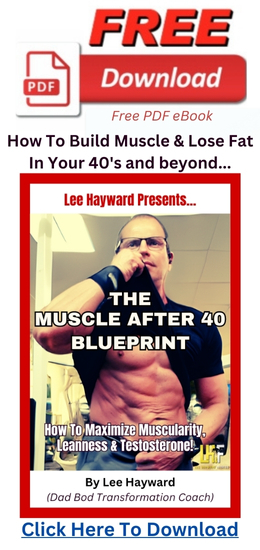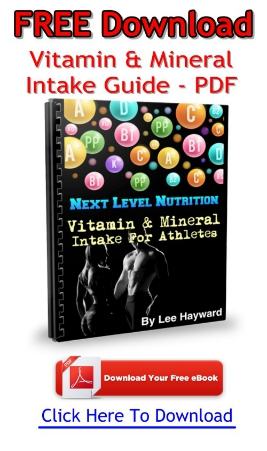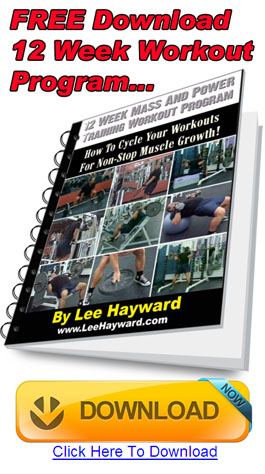![]() – A common question that I get from my online followers is about Amino Acids supplements… Are they any good, or are they just a waste of money?
– A common question that I get from my online followers is about Amino Acids supplements… Are they any good, or are they just a waste of money? ![]()
Well, before we dive into that – we first need to know exactly what we’re talking about… “Amino Acids” are molecules that combine to form protein. When protein is digested, it gets broken down into the various amino acids.
Protein makes up the structural components of our cells and tissues. Our bodies are made up of thousands of different proteins and these proteins are continually being repaired and replaced throughout our lives – which is a process known as “protein synthesis”. So in order to live we require a continuous supply of protein.
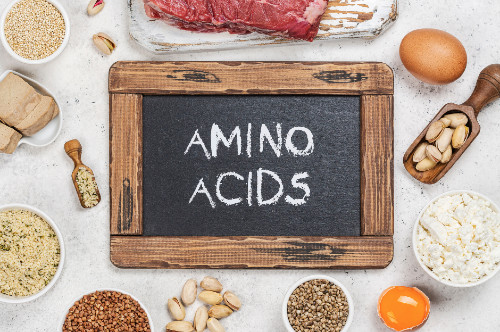
Amino acids are simply proteins that are broken down to their most basic level. To give you an analogy. Imagine a cross section of muscle like a paragraph of written text. Each word in that paragraph resembles a protein. And then each individual letter represents an amino acid.
Just like certain combinations of letters make up words, certain combinations of amino acids make up proteins. There are approximately 500 known amino acids and they all play various roles in the body – everything from aiding with metabolism, to performing critical biological roles in the body, producing hormones, building and repairing tissue, helping us deal with stress, recover from illness, etc.
In humans, there are 20 standard amino acids that are used to synthesize proteins. Of the 20 standard amino acids, 9 are called Essential Amino Acids because the human body cannot synthesize them from other compounds at the level needed for growth, so they must be obtained from food.
Failure to obtain enough of even 1 of the 9 essential amino acids will result in degradation of the body’s proteins (i.e. breaking down body tissue). Unlike fat and carbohydrates, the human body does not store excess amino acids for future use. That’s why we need to eat adequate protein throughout the day in order to provide the body with the amino acids it requires for proper growth and development and to prevent muscle loss.
==============
Amino Acids are classified into three groups:
1. Essential Amino Acids – these cannot be made by the body. As a result, they must come from food.
2. Nonessential Amino Acids – our bodies can produce these amino acids on it’s own, even if we do not get them from the food we eat.
3. Conditional Amino Acids – these amino acids are usually not essential, except in times of illness and stress.
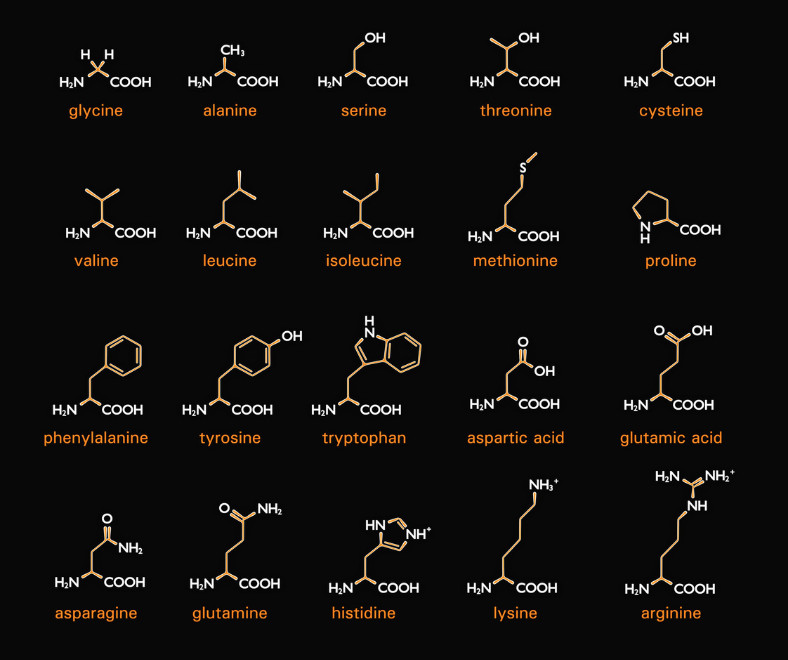
The 20 Standard Amino Acids Are:
Glycine, Alanine, Valine, Leucine, Isoleucine, Proline, Phenylalanine, Tyrosine, Tryptophan, Serine, Threonine, Cysteine, Methionine, Asparagine, Glutamine, Lysine, Arginine, Histidine, Aspartate, and Glutamate.
The 9 Essential Amino Acids Are:
Leucine, Isoleucine, Valine, Lysine, Methionine, Phenylalanine, Threonine, Tryptophan, and Histidine.
Of the 9 Essential Amino Acids there are 3 Branched Chain Amino Acids:
Leucine, Isoleucine, and Valine.
Branched Chain Amino Acids (BCAA’s) fall into the category of essential amino acids. But BCAA’s are metabolized within muscle tissue, allowing them to be oxidized and used as energy by muscle cells.
NOTE: most bodybuilding amino acid supplements contain BCAA’s, but these days we’re seeing a rise in popularity of EAA supplements. Personally I’d recommend choosing EAA’s over BCAA’s because they contain all 9 of the essential amino acids that your body needs, and not just the 3 branched chain amino acids.
Conditional Amino Acids include:
arginine, cysteine, glutamine, tyrosine, glycine, ornithine, proline, and serine. Again, the body can manufacture these amino acids on it’s own without dietary sources. But in times of illness and stress they are needed in greater amounts, so it would be advantageous to consume them through dietary sources to ensure there are enough on hand to meet the body’s needs.
==============
Will Supplementing with Amino Acids improve your muscle gains in the gym?
Now that we covered what amino acids are, the big question is will taking them (i.e. BCAA’s or EAA’s) help improve your exercise performance and muscle gains?
Well it depends…
In some cases supplementing with amino acids will have a significant improvement in one’s performance and progress in the gym, and in other cases it will have little noticeable impact at all.
The main advantage that amino acid supplements have over high protein food is rapid absorption. BCAA or EAA supplements are already broken down into their simplest form and are readily available to be utilized by the body. When you take an amino acid supplement, those amino acids will be available to be utilized by the body within 20 minutes.
Whereas high protein food needs to be digested by the body in order to get to the amino acids that will be used for recovery and muscle growth. So when you eat a chicken breast (or any other high protein food) it will take several hours before that protein is broken down into the amino acids that will be used to recover from your workout.
=================
The Need For Speed… ![]()
![]()
To help you get a better understanding of when and how speed of absorption can make a difference, let’s use cars and automotive performance as an analogy…
For the average person who drives their car back and forth to work and to run errands. They are not going to need any special advanced fueling strategies.

But what about a race car?
In a race situation every second counts. When a race car comes into pit lane they have high speed fuel pumps to fill up the car as fast as possible. They have a pit crew who can change a set of tires in the matter of seconds. Everything is designed to be as fast and efficient as possible because every second that they waste in pit lane is time lost on the track – and that can mean the difference between winning and losing.
Now compare that to when you take your car to the gas station, does it really matter how long it takes you to fill up with gas? If it takes you 10 seconds or 10 minutes, in the greater scheme of things will that make any difference to you and the performance of your car? Probably not.
Filling up your daily driver with high octane race fuel from a high speed fuel pump won’t help you get through rush hour traffic any faster. But it will help a race car get around the track faster. So it’s not a matter of “Good” or “Bad”, it really depends on the needs and situation.
The same idea applies when considering supplements like Amino Acids – whether or not they will make a difference depends on the individual and their training situation.
For the average Joe who lifts weights for an hour 3 days per week. Supplementing with amino acids isn’t going to make that much of a difference. But for a high performance athlete who is doing twice a day training, supplementing with amino acids can make a huge difference.
In the case of the average Joe hitting the gym 3 days per week. Simply consuming adequate protein intake (i.e. 1 gram of protein per pound of lean body mass per day) will provide his body with all the amino acids it needs. Especially since he has 48 hours between workouts to allow plenty of time for the digestion and absorption of the protein and amino acids.
But with a high performance athlete who is doing a strength training workout in the morning, followed up with a game practice in the afternoon. He will need to be able to quickly recover between those sessions in order to perform at his best.
In a high performance situation, consuming rapidly absorbing Amino Acid supplements will speed up the digestion and utilization of those amino acids much faster than could be achieved by eating solid food protein. Thus there will be faster recovery and better performance for the next training session.
This also applies for prolonged endurance events that can last several hours – like long distance cycling, long distance running, triathlon – or when doing a sports competition with multiple events per day.
When you stretch out the duration of your activity over several hours you will deplete the body’s amino acid and glycogen reserves so you will need to be able to re-fuel quickly without causing a lot of digestive stress. In these situations fast absorbing amino acids, along with fast absorbing carbohydrates, are the preferred fuel sources to be used.
But for the average gym workout that lasts about an hour, you will have more than enough energy and amino acids stored within the body to get through that workout before you deplete your reserves.
==============
Should YOU Take Amino Acid Supplements?
After reading this hopefully you have a better idea of what amino acids are, how they work, and how they can help aid with the recovery and growth process.
But you may still be wondering if YOU should take them…
Well the simple answer is they won’t hurt…
Even if you are the “Average Joe” doing 3 moderate intensity workouts per week, you can supplement with amino acids as an extra insurance policy to make sure you’re meeting your body’s needs and optimizing your recovery.
But if you’re on a tight budget and want to take the minimalist approach to supplements – then you don’t need them. You can still make progress simply by being consistent with your workouts, consistent with your nutrition, consistent with your sleep, and living healthy lifestyle habits.
Amino acid supplements can help, but they are by no means a “Must Have”. They can give you a slight edge marginal gain, but it’s not going to make or break your progress. Diet and Exercise are the only things that you really NEED to make progress, supplements (including amino acids) are really just the icing on the cake.
In my own case, I do supplement with EAA’s and notice a benefit from taking them. I often do weight training and cardio in the same day, so the amino acids help speed up recovery between those 2 workouts.
How I take them is by using EAA powder drink mix and adding it to my water bottles and sip on it while I’m working out. The drink mix makes my water taste better – so I will drink more and prevent dehydration – in addition to providing rapidly absorbing amino acids to help optimize recovery.
Now I’ll still focus on my diet and consuming at least 1 gram of protein per pound of lean body mass per day in addition to taking EAA supplements.
I prefer to have all my basis covered so I can maximize the hard work I’m putting into the gym, rather than leaving it to chance and potentially short changing my progress due to falling short on meeting my protein and amino acid needs.
If you would like some help with planning out a fitness, nutrition, and supplementation program to get in your best shape – just click on the link below and sign up for a Free One-On-One Strategy Session Coaching Call.
During our call we’ll do a “Fitness & Nutrition Audit” of your current program and brainstorm some ideas and action steps for how you can maximize your results and achieve your muscle building & fat loss goals faster and easier than what you’re currently doing right now.
If I honestly feel that I can help you, then I’ll let you know. And if I can’t, then I won’t BS you, but I will offer some suggestions to experts or resources that can help you.
Either way, at the end of our strategy session call you’ll walk away with more clarity about what you need to do next in order to move in the right direction towards building the body you want.

Sign up for a Free One-On-One Strategy Session Coaching Call with Lee.

